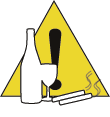Top 10 Health and Safety Issues
-
Be Informed about local Safety Issues
Orientation materials and country guides can help you better understand the countries and cities where you will be studying and traveling. Check out the US State Department and CDC information. Know where you're going and what to do and not do once you get there. -
 Avoid High–Risk Activities
Avoid High–Risk Activities
Certain activities like bungee jumping, whitewater rafting, mountain climbing, and shark diving adventures which can put you in danger. If you choose to participate, make sure that you have adequate support and lots of insurance. -
Be Prepared to Respond to Emergencies
The more prepared you are for emergencies the better able you will be to respond. Where will you go if you need to leave the country? What will you do if you are a victim of a crime or are injured? What if someone else needs help? -
Avoid Crime and Violence, Including Sexual Harassment and Assault
Be aware of the safe and unsafe areas where you are living and traveling. Use your safety skills from the U.S. while abroad: don't travel or go out alone (buddy system), don't go into bad neighborhoods, be more careful at night, etc. Be aware of stereotypes of U.S. men and women and understand local verbal and non–verbal communication. -
 Make Sure your Mode of Transportation is Safe
Make Sure your Mode of Transportation is Safe
Whether you are arranging your own transportation or you are being led by your program provider, look closely at what the safest type of transportation is for where you're going, what routes you're taking, and at what time you're traveling. -
 The Effects of Alcohol and Drugs can Hurt You
The Effects of Alcohol and Drugs can Hurt You
Although alcohol may be legal at a younger age abroad, its use and abuse is many times tied to being a victim of crime, violence, accident, and injury. Drug use abroad can result in severe consequences—plan on being treated as guilty (in jail) until proven innocent outside the U.S. -
 Be Able to Communicate at All Times
Be Able to Communicate at All Times
Methods of communication for you and those that are trying to find you are: cellular phone, regular phone, e–mail, fax, and in remote locations if available satellite phone. -
 Take Care of your Physical, Dental, and Mental Health
Take Care of your Physical, Dental, and Mental Health
Prior to going abroad, get a physical, complete foreseeable dental work, and consider your psychological stability. Be prepared for the physical and mental challenges abroad. When you get abroad, find suitable care/support facilities. -
 Have Adequate Insurance and 24 Hour Emergency Assistance
Have Adequate Insurance and 24 Hour Emergency Assistance
Types of insurance to consider purchasing include major medical (in the U.S. and abroad), emergency assistance, repatriation of remains, travel insurance, and coverage for kidnapping and ransom. -
Choose a Quality Program Provider
There are no minimum standards in the study abroad field. You need to carefully pick a quality study abroad provider in terms of both academics and student services. Along with costs and courses, find out about the safety problems faced by students in the past.




 Austria
Austria


